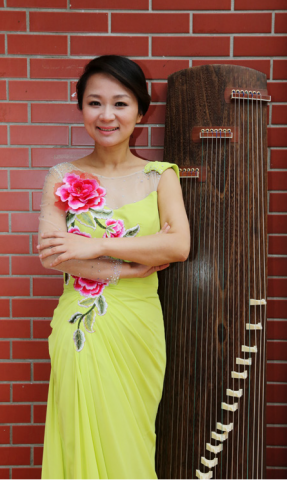
Qi Yao, zheng performer, composer, associate professor and master supervisor, is a teacher of zheng performance and director of the Chinese plucked instrument department at Shanghai Conservatory. She also leads the Zheng Chamber Group, serves as deputy secretary of the Zheng Academic Society in the General Chinese Musician Association, is a director of the Shanghai Musicians Association, and is a member of the Chinese Female Composers Association. A graduate of the Nanjing Arts Institute and Shanghai Conservatory, she led her students to create the Qi Yao Zheng musician group (2010) and rebuild the Zheng Chamber Group of Shanghai Conservatory (2012). In 2013, she organized the First Shanghai Art and Zheng Music Festival. She and her students are frequently invited to perform at high-visibility events throughout China. Among her numerous awards and honors are 2nd prize in China Central Television’s ART international Chinese instrument competition (1989); 2nd prize in the professional youth group of the Chinese Ministry of Culture’s Orient Zheng performance competition (1995); 2nd prize in the Chinese Musician Association’s first (2003) and second (2006) Liu TianHua Chinese national chamber music composition competition; the Great Works in Golden Bells Prize (2005); the National Music Works competition prize (2010); and the great teacher prize issued by Chinese Ministry of Culture.
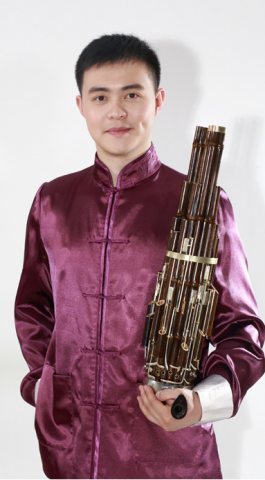
Hua Yifei, a highly talented sheng player, is a graduate student at Shanghai Conservatory. He began lessons in 2007 with the famed sheng soloist and educator Xu Chaoming. Since he was admitted to the college, he has entered the world of contemporary music and improvisation with sheng under the guidance of world-renowned sheng artist Wu Wei. Hua’s outstanding playing has earned numerous prizes, as well as exposed him to a wide range of experience playing traditional and contemporary music on sheng. His activities and awards of note include the silver prize in the ninth Golden Bell Prize of Chinese Music, the top music prize in China (2013); two golden prizes in the First Chinese Sheng Art Festival Competition (2016); three invitations by the Atlas Ensemble to participate in the Atlas Festival at the Conservatory of Amsterdam, which included performing traditional and contemporary pieces and giving lectures and demonstrations (2013-2016); and his sheng recital “Solar Planet” at the Shanghai Conservatory, accompanied by the Zhejiang Chinese Traditional Orchestra.
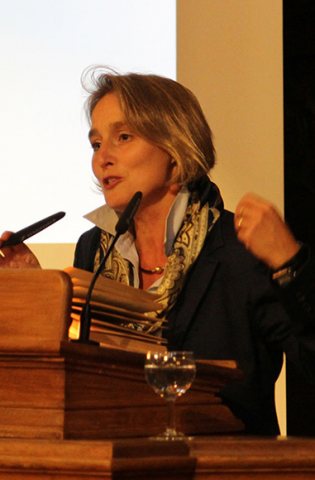
Barbara Mittler holds a Chair in Chinese Studies at the Institute of Chinese Studies, University of Heidelberg and is Director of the Cluster of Excellence at the University of Heidelberg “Asia and Europe in a Global Context.” She began her studies of Sinology at the University of Oxford (MA Oxon 1990), and has spent research periods in Taiwan, the People’s Republic of China, Hong Kong, and at Harvard and Stanford Universities. In 2008 she was elected member of the National Academy of Sciences LEOPOLDINA and, in 2013, the Heidelberg Academy of Sciences. In 2009 she won the Henry Allen Moe Prize in the Humanities, American Philosophical Society; in 2013, her book-length study of the Chinese Cultural Revolution won the Fairbank Prize by the American Historical Association. Her research focuses on cultural production in greater China covering a wide range of topics from music to visual and historical print media in China’s long modernity. She is also embarking on two new projects: a collaboration with prize-winning visual historian Sumathi Ramaswamy (Duke), Embodying the Nation—Representations of Gandhi and Mao; and a new monograph, “And there is only one Lang Lang…”—Music in China from a Transcultural Perspective.
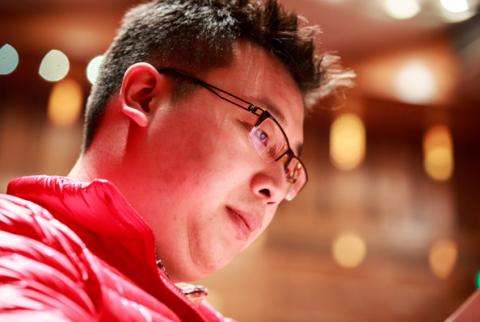
Weiyi DAI, Chenguang scholar, is a lecturer at the Digital Media Art Institute and leads the Teaching and Research section of Music and Media at Shanghai Conservatory of Music while pursuing a doctorate in composition and studying with Prof. Liqing Yang and Prof. Shuya Xu. His work centers on music composition and sound design in multimedia environments. Since 2006, Dai has been commissioned by music institutes and festivals around the world, such as the Cologne Modern Music Festival and Shanghai International Electronic Music Week. In addition, he has received a support for a number of research projects, including from the Shanghai City Board of Education and the Chenguang Innovation Program.
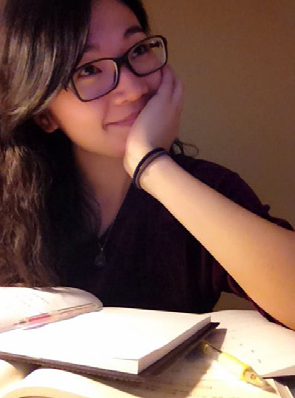
WANG Tiantian is a composer, doctor of music, and professor of composition at Shanghai Conservatory of Music. She studied composition and electronic music composition under Prof. Shuya Xu starting in 2010 and in 2013 received her doctorate as the conservatory’s first doctoral graduate in electronic music composition. During these years she created a great number of pieces for solo, ensembles, and orchestra, representing a broad range of styles. She also maintains strong international connections in her composing and theory research.
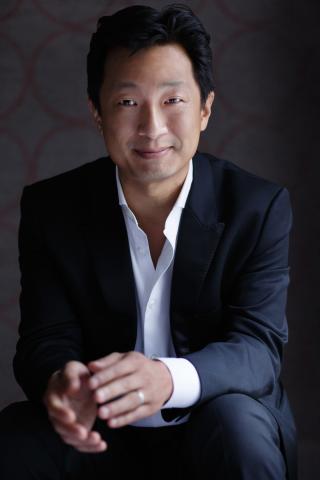
Associate Conductor for The Shepherd School of Music, Jerry Hou is quickly gaining recognition as a versatile and exciting young conductor. For the past five seasons, he has worked closely with the St. Louis Symphony and their music director David Robertson, including assisting the orchestra and an all-star cast of singers at Carnegie Hall, for an acclaimed concert performance of Benjamin Britten’s Peter Grimes. Mr. Hou also made his debut with the orchestra in the U.S. premiere of John Cage’s Thirty Pieces for Five Orchestras. In the summer of 2013, he served as an assistant conductor for the Lincoln Center Festival, working with conductor Brad Lubman, Ensemble Signal, and director Chen Shi-Zheng in the festival production of the opera, Monkey: Journey to the West. He leads the Shepherd School Contemporary Ensemble and Hear&Now. Beyond Rice University, Mr. Hou serves as Associate Conductor of the Grand Teton Music Festival. A passionate advocate of contemporary music, he has collaborated with composers such as Helmut Lachenmann, Gyorgy Kurtag, Luca Francesconi, Steve Reich, George Lewis, Bernard Rands, Mark-Anthony Turnage, Unsuk Chin, Brett Dean, Harrison Birtwistle, Pierre Boulez, and Peter Eötvös.
Born in Taiwan, Mr. Hou received his early musical training in Chicago and Minneapolis. After completing a master’s degree from the Shepherd School, he went to Europe to study contemporary music performance with Pierre Boulez and members of the Ensemble Intercontemporain at the Lucerne Festival Academy and with Peter Eötvös and members of the Ensemble Modern at the Ensemble Modern Academy. Mr. Hou has conducted orchestras such as the Houston Symphony, St. Louis Symphony, Orchestra of St. Luke’s, Rochester Philharmonic BBC Scottish Symphony Orchestra, National Arts Centre Orchestra, and Luxembourg Philharmonic Orchestra, as well as contemporary music groups including Ensemble Modern, Bang on a Can All-Stars, Slee Sinfonietta, Alarm Will Sound, and Ensemble Signal.
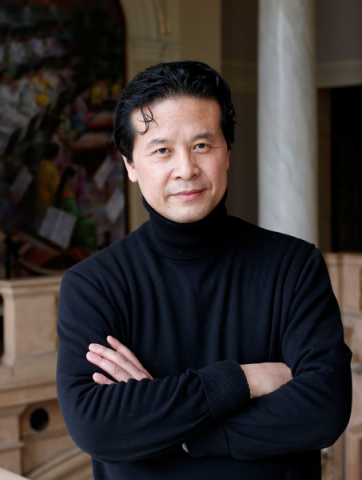
Xianglin ZHOU serves multiple roles at Shanghai Conservatory: professor of composition, doctoral advisor, director of the Dean’s Office and Admissions Office, and secretary of the Composition Committee. He also serves as a council member on the Shanghai Musician Association. His major works include Caprice, ranked among contemporary China’s “Great Piano Works”; Jiang Cheng Zi and Shuang Sheng Zi for baritone and piano; Su for piano and four cellos; Jumping Strings for twelve erhus; Dajiaye for daliuzi; and various orchestral and choral works such as Ode to the Sun, The River Flows East, Dawn Breaking Over the Sea, Xumen Caprice, Warming Mountain in February, Huayao Sandaohong, and Dongmeng. A number of these are recognized among Shanghai’s Great Composition Projects in Literature and Arts, and his works have been performed throughout Asia and the world. Zhou’s honors include second prize in the 18th National Musical Composition Competition (folk music category), third prize in the 13th National Musical Composition Competition (Symphony category), the Shanghai Outstanding Talent Award for Arts, second prize of the Shanghai Teaching Achievement Award, third prize for the He Lvding Foundation Award, and first prize of the Fu Chengxian Music Memorial Scholarship. His students are also winners of various competitions.
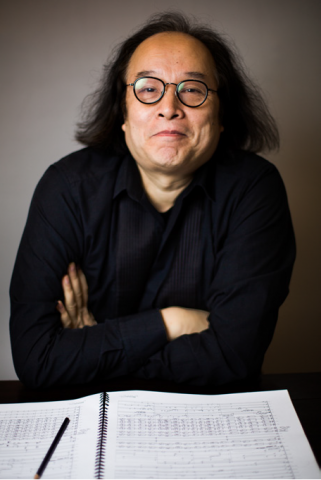
YE Guohui holds a Doctor of Musical Arts (DMA) in composition and is professor of the Composition Department at Shanghai Conservatory of Music. He was selected by the Central Committee of the CPC to the shortlist of “Cultural Masters” and “Four Batches Talents” and is a State Council Expert for Special Allowance. Ye’s doctoral dissertation György Kurtág’s Musical Composition and Concept is the first comprehensive and systematic research ever in China on the topic. His musical language involves a distinctive perception of sounds and their attributes, reflecting his deep contemplation on the integration of various factors such as the nature of music itself, space effects, Chinese elements, and modern music techniques. Of note among numerous works, his Peking Opera Impression for mixed chorus won First Prize in the 4th Composition Competition of Taiwan Provincial Orchestra (1994); New Century Overture was performed on the celebration of Hong Kong’s return and won the Silver Award of Symphonic Works for the Return of Hong Kong (1997); China Overture won second prize in the 10th Nationwide Musical Works [Symphonic Music] Awards (1998); Prayers Come from the Jungles, inspired by his experiences in Hungary, won 2nd prize in the 2002 CCA Taiwan International Composition Competition; and Late Autumn for Orchestra won the European Composer Award, the only Grand Prize for commissioned works of Young Euro Classic Festival in German (2007). Ye was selected as one of One Hundred Excellent Young Artists of the China Federation of Literature, and won the Education Awards of Bao Steel, second prize (in cooperation) of the Fifth Higher Education National Teaching Achievements Awards, and the Medal of Municipal Glory of Nice, France. Ye has also led several international cultural exchange programs such as the Listening to China project.
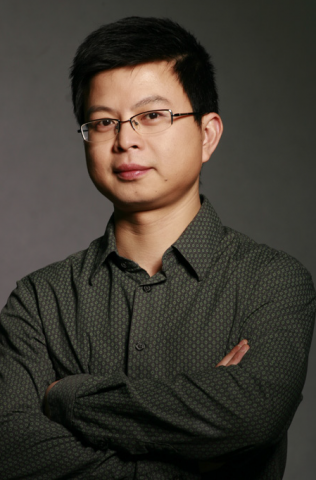
Dongyong Ji teaches as an associate professor in the department of music engineering at Shanghai Conservatory of Music, where he also earned his undergraduate degrees in composing and conducting. In 2009, he obtained a master’s degree in electronic music design, and is now a PhD candidate majoring in electronic music composition under Professor Shuya Xu. During these early years of his career, his works of chamber music, orchestral music, dance drama, and electronic music were performed in Beijing, Shanghai, Hong Kong, Singapore, and Germany. He has also fulfilled commissions for the Shanghai Symphony, Shanghai National Music Symphony, Singapore Symphony, and Shanghai Opera Symphony.
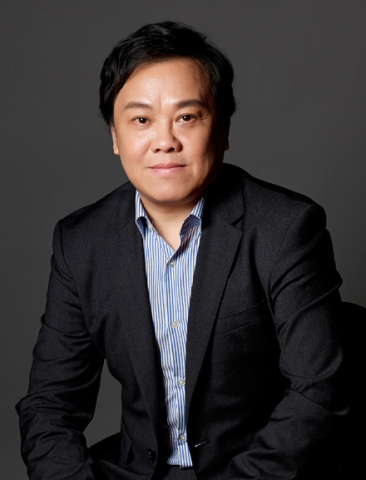
Shuya XU, chairman of Shanghai Musicians Association and art committee director of Shanghai Spring International Music Festival, served as president of Shanghai Conservatory from 2009 to 2014, and continues to serve as the director of the Academic Committee, professor of composition and electronic music composition, and doctoral supervisor. He received his master’s degree (1992) and doctorate (1994) from the Conservatoire National Supérieur de Musique et de Danse de Paris while simultaneously enrolled in the doctoral class of Institut de recherche et de coordination acoustique-musique (IRCAM). His awards include first prize in the Alexander Tcherepnine Foundation composition competition, 1982; first prize in the 5th Besançon International Competition of Symphonic Composition in France; second prize of the 21st Bourges International Competitions of Electronic Music and Sonic Art in France (first prize vacant); second prize in the 15th International Composer Competition “Luigi Russolo” for Young Composer of Electronic Music in Italy (first prize vacant); ACL Yoshiro Irino Memorial Prize in Tokyo; and ‘Best Annual Opera in 2005’ award by Opéra International in France. Xu’s major works include operas and a ballet (“Emperor Kangxi and the Sun King Louis XIV”, “In Memory of Taiping Lake”, “Les Larmes de Marco Polo”) and orchestral works (“Nirvana”, “Insolation”, “Cristal au Soleil couchant”), and have been performed throughout Europe, North and South America, and Asia. Recordings and publications are available on Kairos, Naxos, SACEM/SACD Music Copyright Society, and Luigi Russolo Foundation, and scores are published by Henry Lemoine & Jobert Publishing House. In 2016, Xu’s The Light of Summer, a New York Philharmonic co-commission with the Shanghai Symphony Orchestra, was premiered under the direction of Alan Gilbert.
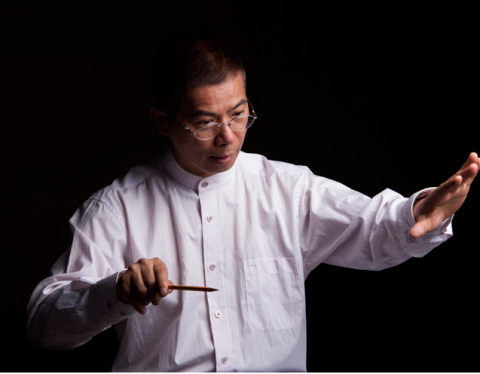
Deqing WEN, a Chinese-Swiss composer, studied composition at Fujian Normal University (China) with Zu-Rong Guo; at the China Conservatory of Music with Wan-Chun Shi and Zhong-Rong Luo; at le Conservatoire de Musique de Genève (Switzerland) with Jean Balissat; at le Conservatoire National Supérieur de Musique de Lyon (France) with Gilbert Amy; and at Columbia University (US) as a visiting scholar under Tristan Murail. He has been listed in Who’s Who in the World of Music by Cambridge Biographic Center. He is currently a professor of composition and artistic directory of New Music Week at Shanghai Conservatory of Music. He is also a member of the Societé Suisse pour les Droits des Auteurs d’Oeuvres and vice chairman of the China-ASEAN musicians union. Wen has been honored with concerts and master classes dedicated to his compositions in China, Switzerland, France, Denmark, the United States, Germany, and Israel. His works are published by Swiss Musical Edition, Bärenreiter-Verlag (Germany), Shanghai Conservatory of Music Press, and Beijing People’s Music Publishing House. His albums are released by Stradivarius Records (Italy), Grammont Portrait Contemporary SWISS, Naxos Records, Shanghai Music Publishing House, and Fujian Audio and Video Publishing House. Wen is a chosen composer of the Prize of the State of Geneva 1993, the Prix Cultura 1999 of the Foundation Kiwanis, and the Composer Prize 2001 of the Foundation Leenaards of Switzerland.
